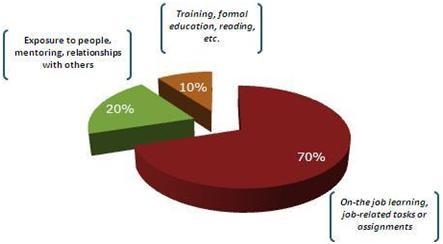For the last couple of weeks I have been doing some training for one of our clients on goal setting and employee development. The training has primarily focused on helping employees write SMART goals and develop action plans and helping managers enhance their coaching skills. One of the handouts I like to use as part of the training is the 70/20/10 rule of development planning. Studies on how adults learn suggest that a good development plan should have 70% related to on-the-job tasks and assignments; 20% people interaction (coaching, mentoring, others to work with); and 10% courses, workshops and readings (see graphic). For those of us that have reviewed action plans, you know that most employees build development plans around courses and formal training and few concentrate on opportunities for on-the-job learning. My message to the managers in the audience was, “courses are a tool for employees to collect knowledge, but they need to use that knowledge back on the job.”

As several managers nodded in agreement, a manager spoke up with some reservations. He was concerned that “using the knowledge back on the job,” was creating nothing but busy work for his employees. Apparently, within his department, when an employee completes an external course that others in the department may need to learn about, it is the responsibility of the course-taker to create a presentation for the department. I have heard similar stories from other clients that they too encourage course-takers to create presentation for their departments and teams. The manager’s challenge was that the hours spent on a presentation to an audience that may or may not have an interest was indeed busy work and did not help the organization overall.







